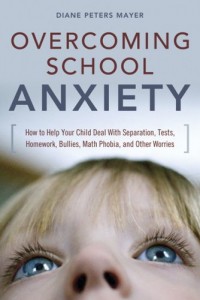Ask any 6th-12th grader “What stresses you out?” and unless it’s the 4th of July the kid is likely to say without hesitation, school. Maybe it’s the social pressure pitting outsiders against insiders. Or the brain-numbing schedule flipping from The Treaty of Versailles to mitochondria to the Quadratic equation at 50 minute intervals. Perhaps it’s the crush who mercilessly crushed you or the coach who never lets you play. Whatever it is, waking up on a school day and wishing it was Saturday is totally normal. On the other hand, sometimes parents see kids resisting school with such ferocity that something else is going on. That something else may be School Refusal Behavior and it isn’t normal. Not as in: normal functioning. It’s a recognized anxiety disorder that takes “I don’t like school” to a whole other level where a child’s fears get in the way of … living.
According to Dr. Christopher Kearney, an expert on school refusal disorder, this problem affects 5% to 28% of children during their school lives. Most commonly affected group? Not little kindergartners, but 12-18 year olds.
In case this is all new to you, School Refusal Behavior has nothing to do with students preferring to slack off instead of going to class. Kids suffering with this are terrified of going to school. Even parents who never loved school may be baffled, embarrassed or frustrated by the child’s behavior. They may wonder, “Why can’t she just drop all this drama and get herself out the door?” If a parent isn’t informed, it’s a reasonable question.
Maggie Hahn, Clinical Coordinator of the Adolescent Psychiatric Unit at Northwest Community Hospital in Arlington Heights, IL. has an answer:
“It breaks down into two reasons,” she says “Some (kids) are terrified of something in school, either taking tests, or thinking that the other kids are laughing at them. Others have actual separation anxiety, and are afraid that something bad will happen at home while they are gone.”
To give you a sense of what it can feel like for the kid, here are some emails I’ve gotten:
For some reason I don’t really fit in with other teens. I have a habit of making every situation with new friends really awkward or people think I am weird. I don’t do anything outright to make them think this but a lot of the time I don’t know what to say to someone I have just met and then I get nervous. I hate the way I am and it makes it really difficult for me to make friends in new environments. I guess I just don’t quite have the quick wit or sense of humor necessary to make people like me or something. Anyway my social anxiety is a big problem because I am going to a new school and leaving my two friends next year and I am going to have to make new ones and I don’t know how to get over my problems so people like me. Please help!
And this one:
I used to love to learn but it seems as though ever since 10th grade I’ve gotten slower and I know that I do suffer from anxiety, but of course mom doesn’t believe me. I want to get my life straight and I need help.
Doesn’t sound like much fun. And too many students suffering from School Anxiety don’t let anyone know how bad it is for them. That’s a shame, because these problems can be treated successfully. The first step is helping parents understand what is and what isn’t perfectly normal when their kids start to show signs of avoiding school. The other part is knowing what resources are out there to help parents help their kids.
In this week’s podcast I talk with Diane Peters Mayer, author of Overcoming School Anxiety: How to Help Your Child Deal with Separation, Tests, Homework, Bullies, Math Phobia, and Other Worries.
Have a listen here:
[QUICKTIME http://www.anniefox.com/podcast/FC010.m4a 300 300 false true]
If you have iTunes, you can subscribe to this podcast in the iTunes Store.
Or, you can download an MP3 version here.
Upcoming guests include:
Rachel Simmons, author of The Curse of the Good Girl: Raising Authentic Girls with Courage and Confidence
Rosalind Wiseman, author of Queen Bees & Wanna Bees and Queen Bee Moms & Kingpin Dads
Izzy Rose, author of The Package Deal: My (not-so) Glamorous Transition from Single Gal to Instant Mom
Diane E. Levin, co-author (with Jean Kilbourne) of So Sexy So Soon: The New Sexualized Childhood And What Parents Can Do to Protect Their Kids
Susan M. Heim, author of It’s Twins! and Chicken Soup for the Soul Twins and More
Hannah Friedman, author of Everything Sucks: Losing My Mind and Finding Myself in a High School Quest for Cool
Dara Chadwick, author of You’d Be So Pretty If…
Special thanks to our friend and musician/composer Curt Siffert who let us use his song, “Kingdom” for the opening of this podcast.
*What’s a podcast? “A podcast is a series of digital media files, usually either digital audio or video, that is made available for download via web syndication.” –Wikipedia… So, in this case, there’s an audio file for you to listen to (in addition to reading the above).













